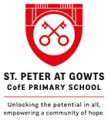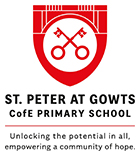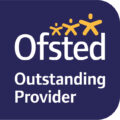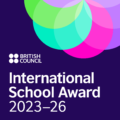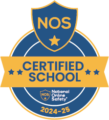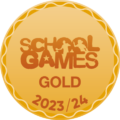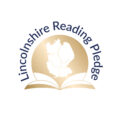EYFS
The EYFS Curriculum at St Peter At Gowts C of E Primary School
Vision Statement
Special, all of our children are special and unique and we want them to grow as individuals through the opportunities we give them, the experiences they have and opportunities to explore values through all their learning.
Play, play is a vital part of our children’s learning and we want them to have play-based experiences which allow them to develop confidence, resilience and enthusiasm for excellence in learning.
Always excited, engaged and enthusiastic- we will plan opportunities, experiences and resources to ensure our children love and are inspired in their learning.
Growing, we want our children to grow to celebrate differences and recognise the special qualities in others and in our community.
To make sure our children are happy in their play, happy in their learning and happy in their life.
Intent
At St Peter at Gowts, our EYFS curriculum is inspiring and creative unlocking potential in all. Our curriculum seeks to ensure that all pupils flourish through challenge, support and a broad and balanced curriculum rooted in shared values and consistently high expectations while striving for excellence. St Peter’s EYFS curriculum is fashioned through our golden threads of values, inspiration, excellence and community.
Our EYFS curriculum is designed to be exciting and engaging, focusing around purposeful play, open-ended resources and a rich learning environment with weekly awe and wonder experiences to inspire and enthuse our children. Our curriculum incorporates our vision, our ethos, our environment, our daily routines and timetables, our interactions and engagement with our children in addition to our written curriculum. It is designed to have a level of flexibility which responds to the needs of our children and enables children to help steer the curriculum to support their learning. Our long term curriculum is designed to be flexible and adaptable according to the needs and interests of our children. We have a focus on the development of communication, vocabulary and language, focusing on our children’s starting points. Our curriculum is carefully planned based on the needs of all of our children and their interests, thinking carefully about their background and experiences and is designed to give children, particularly the most disadvantaged, the knowledge, self-belief and cultural capital they need to succeed in life.
As a result of our rich and diverse community, we currently have 43% EAL in school and twenty different languages. Many of our children start with no English in Nursery and many of our parents only speak their home language to their child so our curriculum is designed to be rich in language and communication experiences. Our first hand experiences and activities using objects of reference, are a key strand throughout our curriculum to develop language. We use songs and books as a key focus of our curriculum to support language development.
We recognise and look to provide for the needs of our EAL learners through speaking in other languages (we have a TA who can speak other languages and use translation tools such as talking pens and Alexa to speak in other languages as well as staff learning simple words in different languages we have represented in our setting), visitors of different cultures, celebrating festivals from different cultures, singing and stories in other languages, representing pattern and print from other cultures, using dual language books and audio CDs in the setting and developing a cultural awareness in all.
In our school and local community, we have a wide range of cultures and we seek to broaden our children’s understanding of the world ‘on their doorstep’ and beyond through their experiences in the curriculum, for example experiencing food and festivals from the cultures in our setting, welcoming and working with members of our local community and working closely with our families through regular shared experiences. Our curriculum is planned to give many opportunities to experience life, celebrations and experiences from our cultures to promote harmony and understanding in our children as they grow and to prepare them for their role as a proactive citizen in our multicultural society.
Lincoln is in the top third of the most deprived districts nationally and there are significant levels of deprivation affecting skills and employment. Many of our children don’t experience the range of career opportunities they could have in the future so our curriculum is designed to give them experiences of the wider world of work through our visits and visitors and key themes. Through our curriculum we seek to ensure our children aspire to be the best they can be and we seek to be ‘unlocking potential in all’.
We recognise that many of our families do not have their own gardens and indeed outdoor space and through our curriculum and provision, we aim to support our children to learn outdoors and develop their physical skills, problem solving skills in the outdoor physical space and through our physical experiences in the curriculum. We recognise Lincolnshire’s priority health issues to increase the level of physical activity and resilience through this.
It is our intention that our children in EYFS develop their love and enthusiasm for learning through their play, based on what they already know and can do and they develop resilience, engagement, problem solving, collaboration and aspiration to support them in their future learning. We link this to the most in-demand skills employers look for in order to start our children on their learning journey to future career opportunities (IT skills, adaptability, creativity, collaboration for example).
As a staff we considered the key outcomes for our children at the end of EYFS and have tailored our resources and planning to ensure we give children to opportunities to achieve in these areas. Our aims and aspirations are based on our children’s cultural capital. They are:
Nature– recognising creatures and not being afraid, caring for creatures, observant, looking after plants and developing skills to grow plants and use and eat their produce.
Why?-Many of our children do not have any experience of pets or animals and live in environments which do not give them the opportunity to grow plants and experience nature.
Understanding of eachother– their place in the world, tolerance and acceptance of others conflict resolution, enjoying a range of celebrations.
Why? We live in a multi-cultural community where racial conflict has been known to arise and our children need to be able to understand others and the world around them to become a responsible citizen in our community.
Physical skills– co-ordination skills in order to be able to ride a bike, climb trees, balance, jump and explore their space and to be able to use real tools to design and build their own creations.
Why? Our children often start Nursery below where we would expect them to be with their physical skills and this is partly due to their environment- many of our children do not have gardens or outside spaces and don’t have access to many opportunities to develop key physical skills both gross and fine motor.
Risk Taking– to be confident in taking risks.
Why? We are aspiring to support our children to become confident in identifying risks and taking appropriate risks to learn to deal with risk as they grow. We feel this is something that our children need to become confident learners as through taking risks they learn to grow.
Language– to be able to speak in a full sentence, making up their own stories and using language to make their wants and needs known to others.
Why? To support our children in their development of language- many of our children start in Nursery with no English (coming from a different cultural background) or have poor language and communication skills when starting. Language and communication is fundamental for our children to develop all of their other skills and we prioritise these skills in all our time with our children.
Our curriculum is based on the 7 statements written in the EYFS Statutory Framework 2021
Communication and Language
The development of children’s spoken language underpins all seven areas of learning and development. Children’s back-and-forth interactions from an early age form the foundations for language and cognitive development. The number and quality of the conversations they have with adults and peers throughout the day in a language-rich environment is crucial. By commenting on what children are interested in or doing, and echoing back what they say with new vocabulary added, practitioners will build children’s language effectively. Reading frequently to children, and engaging them actively in stories, non-fiction, rhymes and poems, and then providing them with extensive opportunities to use and embed new words in a range of contexts, will give children the opportunity to thrive. Through conversation, story-telling and role play, where children share their ideas with support and modelling from their teacher, and sensitive questioning that invites them to elaborate, children become comfortable using a rich range of vocabulary and language structures.
Personal, Social and Emotional Development
Children’s personal, social and emotional development (PSED) is crucial for children to lead healthy and happy lives, and is fundamental to their cognitive development. Underpinning their personal development are the important attachments that shape their social world. Strong, warm and supportive 9 relationships with adults enable children to learn how to understand their own feelings and those of others. Children should be supported to manage emotions, develop a positive sense of self, set themselves simple goals, have confidence in their own abilities, to persist and wait for what they want and direct attention as necessary. Through adult modelling and guidance, they will learn how to look after their bodies, including healthy eating, and manage personal needs independently. Through supported interaction with other children, they learn how to make good friendships, co-operate and resolve conflicts peaceably. These attributes will provide a secure platform from which children can achieve at school and in later life.
Physical Development
Physical activity is vital in children’s all-round development, enabling them to pursue happy, healthy and active lives. Gross and fine motor experiences develop incrementally throughout early childhood, starting with sensory explorations and the development of a child’s strength, co-ordination and positional awareness through tummy time, crawling and play movement with both objects and adults. By creating games and providing opportunities for play both indoors and outdoors, adults can support children to develop their core strength, stability, balance, spatial awareness, co-ordination and agility. Gross motor skills provide the foundation for developing healthy bodies and social and emotional well-being. Fine motor control and precision helps with hand-eye co-ordination, which is later linked to early literacy. Repeated and varied opportunities to explore and play with small world activities, puzzles, arts and crafts and the practice of using small tools, with feedback and support from adults, allow children to develop proficiency, control and confidence.
Literacy
It is crucial for children to develop a life-long love of reading. Reading consists of two dimensions: language comprehension and word reading. Language comprehension (necessary for both reading and writing) starts from birth. It only develops when adults talk with children about the world around them and the books (stories and non-fiction) they read with them, and enjoy rhymes, poems and songs together. Skilled word reading, taught later, involves both the speedy working out of the pronunciation of unfamiliar printed words (decoding) and the speedy recognition of familiar printed words. Writing involves transcription (spelling and handwriting) and composition (articulating ideas and structuring them in speech, before writing).
Mathematics
Developing a strong grounding in number is essential so that all children develop the necessary building blocks to excel mathematically. Children should be able to count confidently, develop a deep understanding of the numbers to 10, the relationships between them and the patterns within those numbers. By providing frequent and varied opportunities to build and apply this understanding – such as using manipulatives, including small pebbles and tens frames for organising counting – children will develop a secure base of knowledge and vocabulary from which mastery of mathematics is built. In addition, it is important that the curriculum includes rich opportunities for children to develop their spatial reasoning skills across all areas of mathematics including shape, space and measures. It is important that children develop positive attitudes and interests in mathematics, look for patterns and relationships, spot connections, ‘have a go’, talk to adults and peers about what they notice and not be afraid to make mistakes.
Understanding the World
Understanding the world involves guiding children to make sense of their physical world and their community. The frequency and range of children’s personal experiences increases their knowledge and sense of the world around them – from visiting parks, libraries and museums to meeting important members of society such as police officers, nurses and firefighters. In addition, listening to a broad selection of stories, non-fiction, rhymes and poems will foster their understanding of our culturally, socially, technologically and ecologically diverse world. As well as building important knowledge, this extends their familiarity with words that support understanding across domains. Enriching and widening children’s vocabulary will support later reading comprehension.
Expressive Arts and Design
The development of children’s artistic and cultural awareness supports their imagination and creativity. It is important that children have regular opportunities to engage with the arts, enabling them to explore and play with a wide range of media and materials. The quality and variety of what children see, hear and participate in is crucial for developing their understanding, self-expression, vocabulary and ability to communicate through the arts. The frequency, repetition and depth of their experiences are fundamental to their progress in interpreting and appreciating what they hear, respond to and observe.
We aim for all of our children, no matter what their background, needs or challenges, to develop, aspire and deepen their knowledge in all 7 areas of the EYFS curriculum and are ambitious for all of our learners.
Implementation
Our curriculum is designed to use different approaches to support our children’s learning with a key strand being the opportunity for children to learn through their play and to experience learning in a hands on, practical way. We ensure the environment and provision is inspiring, interactive and engaging for our learners.
Child Initiated play (Learning through Play) is high priority on our timetables and fundamental in our approach to learning. We dedicate extended time for children to be able to have opportunities for sustained learning in their play in order that they reach a deeper level of engagement. Within our provision we provide a range of open ended resources (loose parts play) in order to develop children’s creativity, symbolic play and creativity. We use many ‘real resources’ to aid children in applying skills to their lives and experiences.
We ensure a level of challenge for all learners through our levelled common play behaviours and resources aligned with these, which are focused on the key skills to develop in each area, appropriate to the children’s identified needs, and through our interactions and engagements. We give children resources and opportunities through their play to challenge themselves and often add in a specific challenge using our ‘sound buttons’ and also use Rainbow challenges with our children.
We utilise the skills of our team to ‘go to’ the children in their child initiated time to develop and support their learning and key skills as opposed to ‘adult guided’ activities. Children’s skills can be developed through their own choice of learning, for example mark making in the sand pit or understanding of capacity in the water tray. We support our children’s progression in key skills through our progression grids which we refer to.
We use group shared sessions and key person time to give our children opportunities to experience wow moments, shared learning experiences using first hand experiences and objects of reference. We ensure there are a range of trips and visitors to bring the curriculum alive for our children and give them experiences they might not otherwise have (linked to cultural capital).
We recognise that books have a high impact on our children’s learning experiences and as such our curriculum is designed so that a book is the lead for each of our two week blocks. We have a rich and diverse reading spine of quality texts. We also use books which our children have shown an interest in or that we recognise as teachers and TAs, are engaging and exciting books and we link these experiences to Talk4Write.
We utilise the Read, Write, Inc approach to teaching our children phonics which begins, when children are ready, in Nursery. Pre-phonics activities are designed to cater to pre-phonics skills such as symbolism, physical development which supports the ability to sit still and listen, listening and attention skills, spoken language, meta-linguistic awareness and phonological awareness.
We have carefully considered our Maths curriculum and utilise White Rose Maths for Reception, using some of the models and images with Nursery. We also use Little Big Maths across EYFS to develop key maths skills on a daily basis as well as building in mathematical opportunities and models and images in provision and use a planned maths overview for Nursery.
Impact
We assess regularly and identify what we know the child has learned through our focus weeks, wow moments and staff knowledge of our children. We use a tracking system looking at those children who are working at the expected level (no concerns) those who we have moderate concerns about and those we have significant concerns about. We review any barriers to learning and talk as a team about how to address these, using additional resources as appropriate such as the Early Support Developmental Journal, to pinpoint significant needs.
As a team we have regular meetings to discuss children and their outcomes and review the support and needs of any children we have identified as having concerns about and review on our tracker every half term. This feeds into our planning and next steps.
Our understanding of our children’s learning and progress drives our planning and provision and areas which are seen to be an area which the vast majority of the cohort are working at a lower level in, becomes a focus for enhancing our provision, practice and planned activities.
